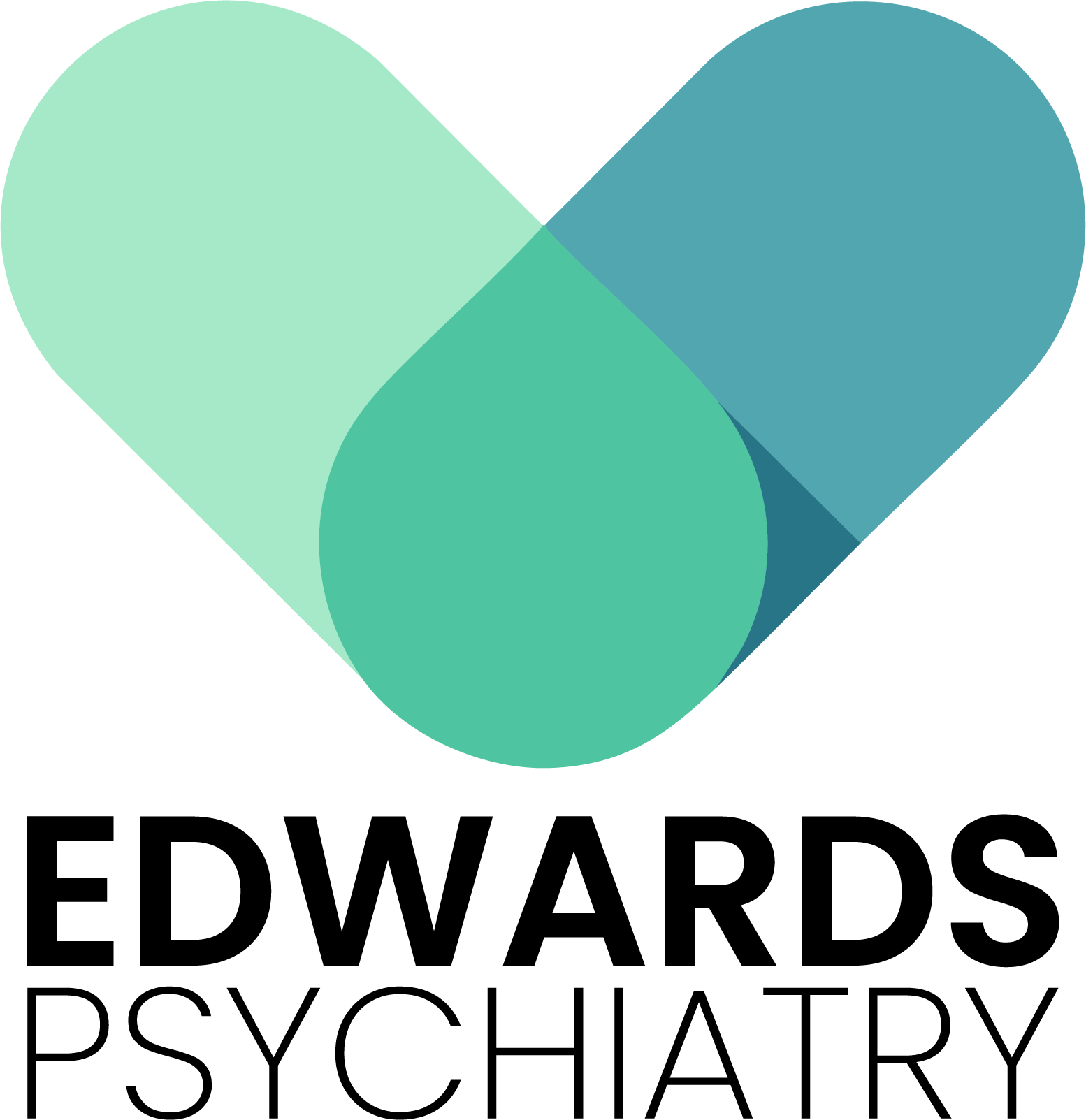5 Red Flags Your Psychiatrist Isn't Listening (And What to Look for Instead) | Seattle Mental Health
How to recognize poor psychiatric care and find a mental health provider who truly understands you in Seattle
When seeking mental health support, one of the most devastating experiences is feeling unheard by the very person who's supposed to help you heal. Unfortunately, many people in Seattle and throughout Washington state have encountered psychiatrists who rush through appointments, dismiss concerns, or simply don't listen to what their patients are saying.
At Edwards Psychiatry, we believe that everyone deserves a mental health provider who listens without judgment, takes time to understand their unique experiences, and collaborates on treatment decisions. As board-certified psychiatric mental health nurse practitioners, we've seen too many patients who've been harmed by poor psychiatric care and have lost trust in the mental health system.
If you're wondering whether your current psychiatrist is truly serving your needs, or if you're searching for quality psychiatric care for the first time, this guide will help you recognize the warning signs of inadequate treatment and understand what compassionate, effective mental health care should look like.
Article Contents
This comprehensive guide covers the most common red flags that indicate a psychiatrist isn't listening to their patients, explores why these problems persist in mental health care, and provides clear guidance on what to look for in a quality mental health provider. We'll also discuss how to advocate for yourself when psychiatric care falls short and offer insights into finding patient-centered psychiatric care in Seattle that honors your experiences and supports your healing journey.
Why Listening Matters in Psychiatric Care
The foundation of effective psychiatric care is the therapeutic relationship between patient and provider. Unlike other medical specialties where physical symptoms can be easily measured, mental health treatment relies heavily on what patients share about their internal experiences, symptoms, and life circumstances.
When a psychiatrist doesn't listen effectively, they miss crucial information needed to make accurate diagnoses and develop appropriate treatment plans. Mental health conditions are complex, often involving psychological, biological, and social factors that require careful exploration through dialogue and observation.
A psychiatrist who truly listens creates a safe space where patients feel comfortable sharing vulnerable information about their thoughts, feelings, and experiences. This openness is essential for identifying underlying issues, understanding how symptoms affect daily functioning, and developing treatment approaches that address the whole person rather than just a list of symptoms.
Research consistently shows that the quality of the therapeutic relationship significantly impacts treatment outcomes across all mental health interventions. Patients who feel heard and understood by their mental health providers are more likely to engage actively in treatment, follow through with recommendations, and experience meaningful improvement in their symptoms and overall well-being.
Red Flag #1: Rushing Through Appointments
One of the clearest signs that a psychiatrist isn't listening is consistently rushing through appointments. If your mental health provider seems more focused on the clock than on what you're saying, this is a serious red flag that your care is being compromised.
Rushed appointments often result from psychiatric practices that prioritize volume over quality, scheduling too many patients in a day to maximize revenue. This approach treats mental health like an assembly line rather than the complex, individualized care it requires.
During rushed appointments, psychiatrists may interrupt patients mid-sentence, appear distracted or impatient, or jump quickly to prescribing medications without thoroughly exploring symptoms or concerns. They might ask rapid-fire questions without allowing time for thoughtful responses or fail to address important topics that patients want to discuss.
The impact of rushed care extends beyond feeling unheard. When psychiatrists don't take adequate time to understand a patient's full picture, they're more likely to miss important diagnoses, prescribe inappropriate medications, or overlook underlying issues that contribute to mental health symptoms.
Quality psychiatric care requires time to build rapport, explore complex symptoms, discuss treatment options, and address patient questions and concerns. While appointment lengths vary, most comprehensive psychiatric evaluations require at least 60-90 minutes, and follow-up appointments typically need 30-45 minutes to be effective.
At Edwards Psychiatry, our private-pay model allows us to spend adequate time with each patient without the constraints often imposed by insurance companies. We believe that rushing through mental health care is not only ineffective but potentially harmful to the people we serve.
Red Flag #2: Dismissive of Patient Concerns or Questions
A psychiatrist who consistently dismisses patient concerns or becomes defensive when questioned is demonstrating poor listening skills and unprofessional behavior. Mental health treatment should be collaborative, with patients feeling comfortable expressing doubts, asking questions, or sharing concerns about their care.
Dismissive behaviors might include interrupting patients when they try to explain their experiences, minimizing symptoms or concerns, or responding with irritation when patients ask about treatment options or medication side effects. Some psychiatrists become defensive when patients do their own research or seek second opinions, viewing this as a challenge to their authority rather than healthy self-advocacy.
This dismissive approach often stems from outdated models of medical care where doctors were viewed as unquestionable authorities and patients were expected to passively accept whatever treatment was offered. Modern mental health care recognizes that patients are experts on their own experiences and should be active partners in treatment decisions.
When psychiatrists dismiss patient concerns, they damage trust and reduce treatment effectiveness. Patients may stop sharing important information, discontinue medications without guidance, or avoid seeking help altogether. This is particularly harmful in mental health treatment, where open communication is essential for progress.
Cultural factors can compound dismissive treatment, particularly for patients from marginalized communities who may already face skepticism or bias in healthcare settings. Women, people of color, and LGBTQ+ individuals often report having their concerns dismissed or their symptoms attributed to emotional instability rather than legitimate medical issues.
A quality psychiatrist welcomes patient questions, encourages active participation in treatment planning, and respects patients' knowledge about their own experiences. They view patient advocacy and research as positive signs of engagement rather than threats to their expertise.
Red Flag #3: Poor Memory or Note-Taking About Your Case
If your psychiatrist frequently forgets important details about your case, asks you to repeat information you've already shared multiple times, or seems unclear about your current medications or treatment history, this indicates poor listening and inadequate record-keeping.
Effective psychiatric care requires careful attention to detail and thorough documentation of patient information. Mental health treatment often involves tracking subtle changes in symptoms, monitoring medication effects, and understanding complex relationships between life events and mental health symptoms.
When psychiatrists don't maintain accurate records or pay attention to important details, they may miss patterns that could inform treatment decisions, prescribe medications that interact poorly with current treatments, or fail to recognize when symptoms are worsening or improving.
Poor memory about patient cases often results from seeing too many patients, inadequate note-taking during appointments, or simply not being fully present and engaged during sessions. Some psychiatrists rely entirely on electronic health records without taking personal notes, which can result in important nuances being lost.
Patients should feel confident that their psychiatrist remembers their unique circumstances, treatment history, and personal goals. When providers consistently demonstrate poor recall, it signals that patients aren't receiving the individualized attention their mental health deserves.
Quality psychiatric care involves detailed documentation, careful tracking of symptoms and treatment responses, and personalized attention to each patient's unique needs and circumstances. Mental health providers should be able to recall important details about your case and build upon previous conversations rather than starting from scratch each time.
Red Flag #4: Prescribing Without Thorough Evaluation
A psychiatrist who quickly prescribes medications without conducting thorough evaluations or exploring non-medication options is prioritizing quick fixes over comprehensive care. While medications can be valuable tools in mental health treatment, they should be prescribed thoughtfully as part of a broader treatment strategy.
Rushed prescribing often occurs when psychiatrists view medication as the primary or only solution to mental health problems. This approach ignores the complex factors that contribute to mental health conditions, including psychological, social, and environmental influences that may require different interventions.
Thorough psychiatric evaluation should include detailed exploration of symptoms, medical history, family history, current life circumstances, previous treatment experiences, and patient preferences regarding treatment approaches. This comprehensive assessment helps ensure that medications are appropriate and that other important factors are addressed.
Some psychiatrists prescribe medications based on brief symptom descriptions without exploring underlying causes, co-existing conditions, or potential contraindications. They may fail to discuss alternative treatments, side effects, or the rationale behind specific medication choices.
Quality prescribing involves shared decision-making, where psychiatrists explain different treatment options, discuss potential benefits and risks, and work collaboratively with patients to develop treatment plans that align with individual preferences and goals.
At Edwards Psychiatry, we believe in comprehensive evaluation and collaborative treatment planning. We explore all factors contributing to mental health symptoms and discuss various treatment approaches, including therapy, lifestyle modifications, and when appropriate, carefully selected medications.
Red Flag #5: Lack of Cultural Sensitivity or Understanding
Mental health symptoms and treatment preferences are significantly influenced by cultural background, identity, and life experiences. A psychiatrist who lacks cultural sensitivity or fails to understand how identity affects mental health is missing crucial components of effective treatment.
Cultural insensitivity might manifest as making assumptions about patients based on their background, failing to ask about cultural factors that influence mental health, or dismissing concerns related to discrimination, identity, or cultural trauma. Some psychiatrists may pathologize normal cultural expressions or fail to recognize how systemic oppression affects mental health.
For many patients, particularly those from marginalized communities, finding a mental health provider who understands their experiences is crucial for effective treatment. This doesn't necessarily mean sharing the same identity, but it does require cultural humility, ongoing education, and willingness to learn about patients' unique perspectives.
Language barriers, different cultural expressions of distress, and varying attitudes toward mental health treatment all require sensitive, informed responses from psychiatric providers. What might appear as symptoms to one provider could be normal cultural expressions to another.
At Edwards Psychiatry, we're committed to providing culturally responsive care that honors diverse experiences and identities. We recognize that many of our patients have specifically sought providers who understand the intersection of identity and mental health, and we work continuously to provide affirming, inclusive care.
What Quality Psychiatric Care Looks Like
Understanding red flags is only half the equation. It's equally important to know what excellent psychiatric care should include so you can recognize when you're receiving quality treatment and advocate for better care when you're not.
Quality psychiatric care begins with adequate time for thorough evaluation and ongoing treatment. Initial appointments should be comprehensive, allowing time to explore your complete history, current symptoms, life circumstances, and treatment goals. Follow-up appointments should provide sufficient time to discuss progress, address concerns, and adjust treatment as needed.
Effective psychiatrists demonstrate active listening skills, making eye contact, asking thoughtful follow-up questions, and reflecting back what they've heard to ensure understanding. They create space for you to share your experiences without interruption and validate the courage it takes to seek mental health support.
Collaborative treatment planning is a hallmark of quality care. Your psychiatrist should explain different treatment options, discuss potential benefits and risks, and work with you to develop approaches that align with your preferences, lifestyle, and goals. You should feel like an active partner in your treatment rather than a passive recipient of predetermined interventions.
Cultural responsiveness involves understanding how your identity, background, and experiences affect your mental health. Quality psychiatrists ask about cultural factors, acknowledge the impact of discrimination or trauma, and adapt their approach to honor your unique perspective and needs.
Accessibility and responsiveness are important aspects of quality care. Your psychiatrist should be reasonably available for questions or concerns, return messages in a timely manner, and provide clear guidance about how to reach them if urgent issues arise.
The Importance of Therapeutic Relationship
The relationship between patient and psychiatrist is itself a powerful therapeutic tool. Research consistently demonstrates that the quality of this relationship significantly impacts treatment outcomes, often more than specific techniques or interventions used.
A strong therapeutic relationship is built on trust, respect, and mutual understanding. Patients should feel safe being vulnerable, confident that their psychiatrist genuinely cares about their well-being, and assured that they won't be judged for their thoughts, feelings, or experiences.
This relationship develops over time through consistent, positive interactions where patients feel heard, understood, and supported. It requires psychiatrists who bring authenticity, empathy, and genuine curiosity to their work rather than maintaining distant, purely professional personas.
Trust is particularly important in mental health treatment because patients must share intimate details about their thoughts, feelings, relationships, and experiences. When trust is broken through poor listening, dismissive treatment, or cultural insensitivity, it can be difficult to repair and may affect patients' willingness to seek help in the future.
The therapeutic relationship also serves as a model for other relationships in patients' lives. When psychiatrists demonstrate healthy communication, respect for boundaries, and collaborative problem-solving, patients often internalize these skills and apply them in other contexts.
Finding the Right Mental Health Provider in Seattle
Seattle and the greater Washington state area offer many mental health providers, but finding the right fit requires careful consideration of your specific needs, preferences, and goals. The process of finding quality psychiatric care involves research, interviews, and sometimes trial and error.
Start by identifying your priorities. Do you prefer a provider who shares aspects of your identity? Are you looking for specific treatment approaches or specialties? Do you need someone who accepts your insurance, or are you willing to pay privately for higher quality care? Understanding your own preferences helps narrow your search.
Research potential providers through professional directories, practice websites, and patient reviews. Look for information about their training, specialties, treatment philosophy, and approach to patient care. Many quality providers offer brief consultation calls to help determine if they might be a good fit.
Don't hesitate to ask direct questions about providers' approaches to care. How much time do they typically spend with patients? What is their communication style? How do they handle cultural differences or identity-related concerns? How accessible are they between appointments?
Trust your instincts during initial meetings. Do you feel heard and understood? Does the provider seem genuinely interested in your experiences? Do they explain things clearly and involve you in treatment decisions? These subjective impressions are often accurate indicators of whether a provider will meet your needs.
Remember that finding the right provider may take time, and it's okay to change providers if your current care isn't meeting your needs. Your mental health is too important to settle for inadequate treatment.
The Edwards Psychiatry Difference
At Edwards Psychiatry, we've built our practice around the belief that everyone deserves mental health care that honors their experiences and supports their healing. We've seen too many patients who've been harmed by rushed, dismissive, or culturally insensitive psychiatric care, and we're committed to providing something different.
Our approach begins with truly listening to our patients. We take time to understand not just symptoms, but the whole person—your background, experiences, strengths, and goals. We believe that effective treatment requires understanding the complete context of your life, not just the problems that brought you to seek help.
As a private-pay practice, we're able to spend adequate time with each patient without the constraints often imposed by insurance companies. Our initial evaluations typically last 90 minutes, and follow-up appointments are scheduled for 45-60 minutes, allowing time for thorough discussion and collaborative treatment planning.
Cultural responsiveness is central to our practice. We recognize that mental health is deeply influenced by identity, background, and experiences of discrimination or trauma. We work continuously to provide affirming care that honors diverse experiences and acknowledges the impact of systemic oppression on mental health.
Our team includes board-certified psychiatric mental health nurse practitioners with specialized training in various approaches, including integrative psychiatry methods that consider nutrition, lifestyle factors, and complementary treatments alongside traditional psychiatric interventions.
We're committed to collaborative care that respects your expertise about your own experiences. We explain treatment options clearly, discuss potential benefits and risks, and work together to develop approaches that align with your preferences and goals.
Red Flags Versus Normal Adjustment Periods
It's important to distinguish between legitimate red flags and normal adjustment periods that occur when starting treatment with a new provider. Building therapeutic relationships takes time, and it's normal to feel some uncertainty or discomfort initially.
Normal adjustment might involve feeling nervous about sharing personal information, needing time to feel comfortable with your provider's communication style, or requiring several sessions to establish rapport. These temporary discomforts often resolve as trust develops and you become more familiar with your provider's approach.
Red flags, by contrast, involve consistent patterns of poor care that don't improve over time. These might include repeated instances of feeling unheard, consistent rushing through appointments, or ongoing dismissal of your concerns or questions.
Trust your instincts, but also give relationships time to develop. If you're working with a provider who demonstrates respect, cultural sensitivity, and genuine interest in your well-being, temporary discomfort may resolve as the relationship strengthens.
However, if you consistently feel dismissed, unheard, or uncomfortable after several sessions, it may be time to consider finding a different provider. Your mental health is too important to persist with care that doesn't feel supportive or effective.
Advocating for Quality Mental Health Care
Whether you're dealing with red flags in current treatment or searching for new care, learning to advocate for yourself is an important skill that can improve your mental health outcomes and overall experience with psychiatric services.
Self-advocacy begins with understanding your rights as a patient. You have the right to be treated with respect, to have your questions answered, to participate in treatment decisions, and to seek second opinions or change providers if you're unsatisfied with your care.
Prepare for appointments by writing down questions, concerns, or topics you want to discuss. This helps ensure that important issues don't get overlooked and demonstrates your active engagement in your treatment.
Don't hesitate to speak up when something doesn't feel right. If your provider seems rushed, dismissive, or culturally insensitive, it's appropriate to address these concerns directly. Quality providers welcome feedback and will work to address legitimate concerns.
Seek support from trusted friends, family members, or advocates when navigating mental health care. Having someone accompany you to appointments or help you process experiences with providers can provide valuable perspective and emotional support.
Remember that you're the consumer in this relationship, and you have the right to expect quality care that meets your needs. While changing providers can be disruptive, staying with inadequate care often causes more harm than the temporary inconvenience of finding better treatment.
Frequently Asked Questions About Quality Psychiatric Care
How long should psychiatric appointments typically last?
Initial evaluations should generally last 60-90 minutes to allow for comprehensive assessment. Follow-up appointments typically range from 30-60 minutes, depending on the complexity of your needs and your provider's approach to care.
Is it normal for psychiatrists to take notes during sessions?
Yes, quality providers typically take notes to track important information, symptoms, and treatment responses. However, they should balance note-taking with maintaining eye contact and engagement during your conversation.
What should I do if I feel like my psychiatrist isn't listening?
First, consider addressing your concerns directly with your provider. If this doesn't resolve the issue, or if you don't feel comfortable raising concerns, it may be time to seek care elsewhere.
How important is it for my psychiatrist to share my cultural background?
While shared identity can be valuable, it's not absolutely necessary. What's most important is that your provider demonstrates cultural humility, shows interest in understanding your experiences, and provides affirming, respectful care.
Can I ask my psychiatrist about their training and experience?
Absolutely. Quality providers welcome questions about their background, training, and experience with specific conditions or populations. This information can help you determine if they're a good fit for your needs.
What's the difference between a psychiatrist and a psychiatric nurse practitioner?
Both can diagnose mental health conditions and prescribe medications. Psychiatrists have medical degrees, while psychiatric nurse practitioners have advanced nursing degrees with specialized psychiatric training. Both can provide excellent care.
How accessible should my psychiatrist be between appointments?
While practices vary, quality providers typically have systems for addressing urgent questions or concerns between appointments. They should provide clear guidance about how to reach them and when to expect responses.
Taking the Next Step Toward Quality Mental Health Care
If you've recognized red flags in your current psychiatric care, or if you're seeking quality mental health support for the first time, taking action to find better care is an investment in your well-being and future.
At Edwards Psychiatry, we understand how difficult it can be to seek mental health support, especially if you've had negative experiences with providers in the past. We're committed to providing the kind of care that rebuilds trust in the mental health system and supports genuine healing.
Our approach begins with a free 15-minute consultation where we can discuss your needs, answer initial questions, and determine if our practice might be a good fit for you. This brief conversation allows us to understand your concerns and explain our approach without any pressure or commitment.
What to expect during your consultation:
We'll listen to your concerns about previous treatment experiences, discuss what you're hoping to find in a mental health provider, and explain our approach to care. We'll also answer any questions about our practice, treatment philosophy, or practical matters like scheduling and communication.
Getting started with comprehensive care:
If we determine that we might be a good fit, we'll schedule a comprehensive evaluation that typically lasts 90 minutes. This thorough assessment covers your complete mental health history, current symptoms, life circumstances, and treatment goals.
Building a collaborative relationship:
From your first appointment onward, we prioritize building a strong therapeutic relationship based on trust, respect, and collaboration. We believe that you're the expert on your own experiences, and we're here to support and guide your healing journey.
Many of our patients tell us that finding quality mental health care has been transformative—not just for their symptoms, but for their overall relationship with mental health support. When you work with providers who truly listen and care, it becomes possible to address not just immediate concerns but to build resilience and skills for long-term well-being.
You deserve mental health care that honors your experiences, respects your time, and supports your goals. Whether your concerns involve ADHD, anxiety, depression, trauma, or other mental health conditions, quality care begins with finding providers who see you as a whole person worthy of attention, respect, and compassionate support.
Take the first step toward better mental health care by scheduling your free consultation today. Your well-being is worth the investment in finding providers who will truly listen and support your healing journey.
Share This Post
About the Author:
Domenique Edwards, MSN, ARNP, PMHNP-BC
Domenique is the founder of Edwards Psychiatry and a Board-Certified Psychiatric-Mental Nurse Practitioner specializing in ADHD care for adults and families. As a multiracial Black and Italian clinician, she brings both clinical expertise and lived understanding to mental health care, particularly for BIPOC and LGBTQIA+ communities.
Trained at a top university, Vanderbilt University School of Nursing, Domenique has been practicing independently in Seattle since 2017. She's passionate about providing the kind of collaborative, culturally competent psychiatric care she wished her own family had access to, where patients feel truly heard and understood.






